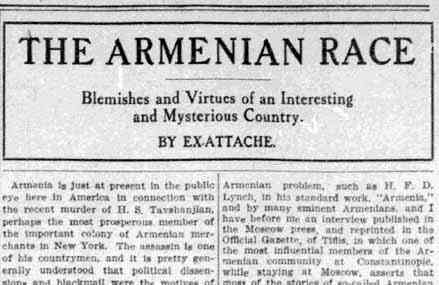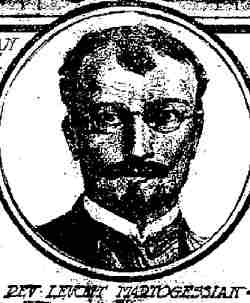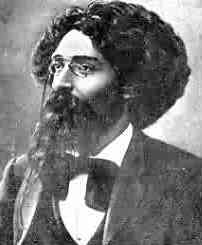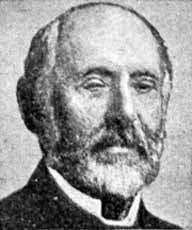|
|
The following article from The
Washington Herald exposes so many of the lies of Armenian propaganda, it's
astounding! This is the kind of article the Vahakn Dadrians, the Peter
Balakians, and the Taner Akcams of the world would go out of their way to
ignore.
Another article that appears to have come directly from the annals of
"Turkish propaganda" — only we know no Turks were behind it —
follows, from The Salt Lake Tribune, Dec. 1895.
Emphasis below is Holdwater's. Thanks to Gokalp.
|
|
|
 |
THE ARMENIAN RACE
-----
Blemishes and Virtues of an Interesting and Mysterious Country.
BY EX-ATTACHE.
The Washington Herald, August 25, 1907
 |
|
The Rev.
Levont Martoogessian was
arrested
for the murder of Tavshanjian. |
Armenia is just at present in the public eye here in America in
connection with the recent murder of H. S. Tavshanjian, perhaps the most prosperous member
of the important colony of Armenian merchants in New York. The assassin is one of his
countrymen, and it is pretty generally understood that political dissensions and blackmail
were the motives of this crime which is merely one of a long series of an almost identical
nature which have been perpetrated in recent years in the United States and in various
parts of Europe, notably in London, Venice, Paris, and Brussels. But people here are
curiously at sea with regard to the political aspirations of the Armenians as to the rival
parties into which they are divided, and as to their status. Indeed, save among students,
and those identified with the American missions in Asia Minor, so useful through their
civilizing influences, only the vaguest ideas prevail as to the whereabouts of Armenia as
to whether the Armenians make their home there, and as to their origin. With regard to the
latter question it is impossible to blame anybody for ignorance on the subject. For the
Armenians themselves are altogether at sea about the beginnings of their race, and
whereas some of them claim to be the lineal descendants of the ancient Assyrians, others
assert that their nation was founded by Haik, son of Togarmak, who himself was a grandson
of Japhet, and a great-grandson therefore of Noah, while there are many, again, who
believe the Armenians to constitute one or more of the lost tribes of Israel. Certain it
is that they have many points in common with the Jews, whom they resemble in feature,
character, and condition. Like them they present the phenomenon of a race dispersed
throughout the world, intermingling, but never fusing with other people, possessed of
incomparable abilities in everything relating to commerce and finance, immutably attached
to their faith, which is based, however, not on the Talmud, but on the Bible, and
cherishing shadowy hopes of a national restoration.
|
|
 |
|
Avetis
Nazarbekian co-founded the
Hunchaks. The party split into two,
and the "reformed" branch was led by
Arpiar Arpiarian |
Before proceeding any farther it may briefly be
mentioned that most of the political murders that have been perpetrated in America,
and in other countries by Armenians against their co-religionists, have been due to
the antagonism existing between the Hentchakiste Secret Society, and that known as
the Arpiarist organization. The Hentchakiste Association was formed In 1877 by an
Armenian journalist, a certain Avetist Nazarbek, in reality for the purpose of
providing himself with a means of livelihood, but ostensibly in order to secure the
suppression of Turkish misrule in Armenia, by means of bringing the woes of the
latter before the public of Western Europe and America. With this avowed object in
view, he founded in London a newspaper entitled the Hentchak, which may be described
as the Tocsin or Alarm Bell, and found no difficulty in obtaining generous
subscriptions from wealthy Armenian residents in America, in England, in France,
Germany, and Italy, describing in lurid colors the terrible cruelties and savage
oppression to which those of their countrymen were subjected, who groaned under the
cruel rule of the In Turkey. As in the case of all these secret political societies,
the Hentchakiste organization attracted a large number of heelers and
adventurers, Armenians of the very worst type, who found it more agreeable to draw
money as political agents from the treasury of the society, and to live on the
subscriptions patriotically offered by their wealthy, industrious, and reputable
co-religionists, than to do any actual hard, honest work. The Hentchakiste
Society proved such a gold mine to scoundrels of this class that, as was only
to be expected, another society of a similar character was founded not long
afterward by another Armenian newspaper man, of the name of Arpiar, on analogous
lines. Of course, the two societies commenced to fight with one another. The
Hentcnakistes accused the Arpianists of being secretly in league with the Turks,
and about four years ago an attempt was made to assassinate Arpiar in Venice, where
he was very dangerously wounded, presumably by Heatchakistes. This greatly incensed
the Arpiarists, who are established in strong numbers at Boston, and the Arpiarist
paper there practically called on the heads of their society for revenge.
|
| |
Indeed their opponents claim that they advocated the killing of the principal leaders of
the Hentchakistes, and this was followed by the shooting of the editor of Young Armenia,
an anti-Arpiarist paper in Boston, and in a murderous attack near Lausanne, in
Switzerland, upon M. Nazarbek, the journalist founder of the Hentchakiste Society. Shortly
afterward, another Hentchakiste leader of the name of Sagatiel Sagouni, was shot and
killed at his home at Nunhead, one of the suburbs of London, and it is alleged that a
number of other murders and attempted homicides here as well as in Europe during the last
three or four years have been due to the blood feuds between these two rival societies. Of
late the more unscrupulous elements of these organizations have received an additional
incentive to crime through the withdrawal of the rich and respectable Armenian merchants
abroad. The latter having become alive to the fact that all the money which they had so generously
subscribed toward the relief of the sufferings of their co-religionists in Turkey was
being merely utilized to maintain in relative idleness a couple of bands of adventurers
and desperadoes, who brought both the name and the cause of Armenia into disrepute,
declined to continue their contributions, and closed their purses. This led the evil
element of the Hentchakiste and Arpiarist societies to endeavor to extort by means of
blackmail and terrorism the funds which they had previously had no difficulty in obtaining
on the plea of patriotic charity, and there is no doubt that there will be many more
crimes such as the assassination of Mr. Tavshanjian, the wealthy New York carpet dealer,
the other day, unless these societies either purge themselves of the evil element in
question, or else are broken up by the authorities as organizations the very
membership of which constitutes an offense against the laws of the land.
|
Sometimes the
stories of atrocities were entirely
bogus, while in other instances the
outrages were deliberately provoked by the members of the society for the purpose of
loosening purse strings.
|
It must thoroughly be understood that there is hardly a reputable well-to-do
Armenian who would not welcome the disappearance of these societies as now
constituted. For he has ended by regarding them as responsible not only for the
increasing evil odor of the cause of Armenia Abroad, but also for the prosecution to
which his co-religionists have been subjected at stated epochs in Turkey. Whenever
the treasury of these two secret societies ran low, the sympathy of the rich
Armenians abroad was excited by stories of massacres and outrages by Turks upon the
Armenians in the Ottoman empire. Sometimes the stories of atrocities were entirely
bogus, while in other instances the outrages were deliberately provoked
by the members of the society for the purpose of loosening purse strings.
This view has expressed by foreign consular officials, by students, and writers on
the Armenian problem, such as H. F. D. Lynch, in his standard work, “Armenia,”
and by many eminent Armenians, and I have before me an interview published in the
Moscow press, and reprinted in the Official Gazette of Tiflis, in which of the most
influential members of the Armenian community at Constantinople, while staying at
Moscow, asserts that most of the stories of so-called Armenian outrages were “manufactured
out of the whole cloth,” and that in the relatively few instances where massacres
had actually taken place, they had been deliberately provoked by unscrupulous
agitators of his own race. Mr. Lynch, in “Armenia” expresses the firm
conviction, based on careful investigation on the spot, that the massacres of
1895 were not the outcome of a spontaneous rising of the Moslems against the
Christians, but provoked from without by Armenian revolutionaries. Of course,
the Armenians are not popular in Turkey. Like the Jews, they are too successful in
every business they undertake not to excite the jealousy of their Moslem neighbors.
And then, too, following as they do the professions of bankers, money lenders,
traders, and loan-mongers, they have most of their less thrifty Moslem neighbors
and fellow citizens in their debt. But they are extremely well treated,
unless there is some deliberate act of provocation, as, for instance, on the
occasion of the Armenian outrages at Constantinople some ten years ago, which
originated in a disorderly and riotous Armenian demonstration at the sublime porte,
leading to a sanguinary conflict between the Armenian rioters and the troops sent to
restore order, whereupon the turbulent Softas or Moslem students took a hand in the
game. But the trouble would never have taken place had it not been deliberately
provoked by the demonstration at the sublime porte, carefully organized by
the revolutionary Armenian societies, apparently for the express purpose of
instigating a massacre, to excite the sympathy of the civilized world in behalf of
the Armenians against the Turks.
|
"[T]heArmenian is freed from military service on the payment of
an annual tax amounting to a little over a dollar..."
"With this exception the taxes which the Armenians pay are identical with those demanded from the Turk, and if anything they are treated
by the authorities with a greater
degree of consideration than the
latter..." |
It is only abroad that one hears of Turkish cruelties and the oppression of the Armenians,
and those of the latter who complain of the persecutions of the Turkish government
mostly all reside either in Western Europe or in the United States.
The Armenians enjoy many advantages at the hands of the Sultan. Thus, whereas every
able-bodied Turk is compelled to serve a certain number of years in the army, his family
during that time being deprived of his assistance and support, the Armenian is freed
from military service on the payment of an annual tax amounting to a little over a dollar,
and which is only exacted during the years which he would have had to serve with the
colors did he profess the Mohammedan faith. With this exception the taxes which the
Armenians pay are identical with those demanded from the Turk, and if anything they are
treated by the authorities with a greater degree of consideration than the latter,
partly owing to their superior wealth, partly to the influence exercised by their
fellow-countrymen in office at Constantinople, and partly, too, because missionaries,
consuls, and ambassadors are known to be on the look-out for anything which could be
construed into religious and race prejudice on the part of the Turks against the Christian
subjects of the Sultan in general, and in particular, against the Armenians. Converse
with any leading Armenian financier or great backer at Constantinople, with any
Armenian proprietor of a manufactory, or with any Armenian government official, and ask
him whether he would wish for a restoration of the kingdom of Armenia, as it existed a
thousand years ago, and be prepared to sacrifice to that object the position, the
prestige, and the interests which be now enjoys at Stamboul. While he might theorize on
the national sentiment of Armenia, he would be just as little disposed to put any project
of that kind into execution as the Rothschilds, the Schiffs, the Guggenheims, the
Strausses and other eminent Hebrew princes of finance would be willing to abandon their
homes and interests in Western Europe and America in order to spend the remainder of their
days in what was once the kingdom of Judea.
|
|
The national aspirations of the sensible Armenians, like those of the Hebrews of the
same class, are, when they exist, purely theoretical. Whereas the Bulgarians prior
to their independence occupied a compact territory, where they were three times as
numerous as the Turks, the Armenians are a scattered race. Indeed the congress of
Berlin in 1878, after a careful investigation of the question, declared itself
powerless on this account to define the limits of Turkish Armenia, and unable
thereof to form any project for Armenian autonomy. In the Ottoman provinces
comprised in the ancient kingdom of Armenia, there are three Turks to every
Armenian, while in the remainder of Asia Minor the Turks outnumber them by ten to
one. All told, there are about 4,500,000 Armenians the world of whom at least
1,500,00[sic] are subject to the rule of the Czar, 1,200,000 in Turkey,
250,000 in Persia, and as many in India. There is a large colony of them in France,
mainly in Paris and at Marseilles; also at Venice, in London, and in various parts
of England. A considerable number of them are to be found in Boston and in New York,
and there are many thousands of them scattered in the Philippines and other Asiatic
archipelagoes. Wherever they embark in business they prosper and thrive, and become
useful and respected members of the community. It is only the relatively small
lawless, shiftless, political adventurer oral carpet-bag element that bring into
disrepute this ancient and historic race, which has furnished so many eminent
statesmen to Turkey, to Persia, to Egypt in the person of Nubar Pasha, and to Russia
in the late Gen. Loris Melikoff, dictator of the empire in 1880.
|
| |
Where Armenia has suffered is undoubtedly from having been used so frequently by Russia
as a pawn in her political game, and as an instrument for her designs to reach the
shores of the Mediterranean, if not via the Dardanelles and Constantinople, at any rate by
the seaboard Armenian province of Cilicia, just opposite the island of Cyprus. Under the
plea of liberating the Christian Armenians from Moslem misrule, she has, during her
successive war, encroached more and more upon those Turkish provinces that in very olden
times constituted the Kingdom of Armenia. That the Armenians prefer the rule of the
Sultan to that of the Muscovite emperor in spite of all that has been said of their
oppression and persecution by the Turk, is conclusively shown by their exodus from Russian
to Ottoman territory which has been in progress for the last quarter of a century.
Notwithstanding all the charges laid at the door of the Padishah on their account, they
avowedly find his rule more liberal, more humane, and more conducive to their happiness
and welfare than that of the Great White Czar.
|
ARMENIAN
CHARACTER
|
The following article, entitled "Armenian
Character," appeared in The Salt Lake Daily Tribune newspaper, December
29, 1895.
That the Turks can be regarded as patterns of gentleness and morality is not claimed
by their best friends. But many writers doubt that the Osmanli deserve all the abuse
which is being heaped upon them in these days. It is pointed out that the Turks,
unlike the Spaniards and Russians, omitted to force the nations whom they conquered
to adopt their religion. It is further pointed out that Western civilization does
not benefit all races. These views are broadly defended by a correspondent in the
Koinische Zeitung, Cologne, who describes himself as a “twenty-five-year resident
of Turkey.” He believes that the Turks benefit about as much by contact with
Western civilization as the American Indians profited by the arrival of the European
settlers. As for the Armenians, their conduct is regarded as altogether unreliable
by this writer. He says:
The Armenians cannot be said to have a historical right to demand independence. Long
before the Turks came, Armenia had been ruled over by foreign nations. The Osmanli
freed them from this worst of degradation and allowed them to settle in
Constantinople, hoping that the Armenians, freed from Byzantine oppression, would
become faithful friends of their new patrons. The Armenians have been petted for
ages, they have amassed great wealth, and many high positions are to this day filled
by them. The bitterness with which the Mussulmans regard Armenian revolt is
therefore easily explained. That the Armenians suffer under the corruption which
rule supreme in Turkey cannot be denied, but they suffer no more than their
Mohammedan fellow subjects, who, in addition to all other ills, have to bear the
burden of military service, from which the Christians are freed. Turkish officials
have to spend money to obtain their positions, and as those positions are not
permanent, they must endeavor to reimburse themselves as speedily as possible.
Much responsibility rests with the Anglo-Armenian committees, who work upon the
easily roused humanitarian principles of the English, and instigate revolt and
bloodshed in the hope of getting official positions in Armenia, if that country is
ever made independent. Much harm, also is done by the American missionaries.
Ostensibly they devote their lives to the education of the young; in reality they
seek to make converts and promulgate modern views among a people entirely unfit to
receive them. As the Turks do not support any missions in America, it is not easy to
see why Turkey should grant hospitality to people who so ill requite it. The reports
of English and American missionaries are very much overdrawn. The Consular
commission sent to investigate the horrors of the Sassoun district has never
published its report. The English declare that the Consular report would rouse
public indignation in England to a fever heat, but the Turks claim that no proof of
the alleged Turkish excesses can be obtained. The Turkish police and the Turkish
troops behaved in the most exemplary manner. No law-abiding Armenian suffered any
inconvenience, and the theatrical flight of some Armenians who sought refuge in
their churches was entirely unnecessary. While the papers spoke of Constantinople as
being in a state of anarchy, foreign ladies and gentlemen on a tour of pleasure
visited places of interest without the slightest obstruction.
|
| |
 |
|
Arminius
Vambery
The Hungarian professor
believed
the Hungarian & Turkish languages
were similar, and helped
Bram Stoker for his research with
Dracula; he is believed to be the
inspiration for Van Helsing |
Prof. Arnim Vambery, the daring Hungarian Orientalist and perhaps the
best living authority on these matters, also believes that the Armenians provoked the
conflict unnecessarily and regards the stories of Turkish cruelty as much exaggerated.
Thus in the Sassoun district, where according to newspaper reports, over 6000 Christians
were murdered, the population was never more than 2000 to 4000, Moslems and Christians
included. On the other hand the demand for reform, not only in politics but also in
private life, is recognized by many Turkish gentlemen. Unfortunately, the press in Turkey
is not permitted to speak out. A gentleman resident in Constantinople sends us a
communication in which it is asserted that Turkish papers are strictly prohibited from
mentioning the Armenian question. Our correspondent incloses the translation of an article
in the Terguman, a Turkish paper published in the Crimea. The article, which illustrates
the position taken by liberal-minded Mussulmans, runs substantially as follows:
The power and influence of the Armenians is due neither to their revolutionary committee
nor to the English, but to their industry and progress. The influence of revolutionaries
and of the English may be overcome, but the real forces behind the Armenians will always
stay. The Armenian question is not political, it is economical. Twenty-five or thirty
years ago the Armenains [sic] began to found commercial houses in the great centers of
Europe, America and India, and their students began to frequent European and American
universities. Neither the Kurds nor the Georgians nor the Tartars followed suit, hence
they must go to the wall. Some members of the latter nations have been educated by order
of the Government, but these, of course, do not count. The Armenians work on their own
initiative, Mussulmans of the Caucasus who wish to sell their silk at Moscow of Lyons are
forced to contract through Armenian houses. The Mussulmans who sell English calicoes in
their little shop in Eastern Turkey are dependent upon Armenian wholesalers. At Bakuin in
the Caucasus there are many more Mussulmans than Armenians, yet the latter furnish by far
the largest contingent of students in the scientific and industrial schools of that city.
They have the best private schools and the libraries and book-shops are theirs. The
benevolent societies are theirs. They support the theaters and subscribe to the Russian
and foreign newspapers to increase their knowledge. Our own people prefer to listen to the
story-tellers and dirge-singers. They look backward rather than forward. Both in Russian
and in Turkey the Armenians have made themselves necessary to the welfare of the nation.
The other races must emulate them. Nobody ever said to the Georgians and Tartars, “Don’t
work, don’t read!” And nobody ever commanded the Armenians to work or read. They go to
work of themselves. If the Georgian neighbors of the Armenians do not work as they should,
their vineyards, their wine-jars, and their stables will become the property of Armenians.
If our Mussulmans do not work, their mulberry groves, their caravansaries and their green
pastures will, little by little, be bought up by the Armenians. The money will be spent
and the property will remain in the hands of the Armenians. There is no defense against
this sort of thing but work and education. These, and not the friendship or enmity of
England, will settle the Armenian question.
--Translated and condensed for the Literary Digest.
|
|